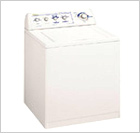|
home | bibliography | related
links
Energy Saving Clothes Washers

About Clothes Washer Efficiency:
A typical clothes washer will cost almost
$1,100 to operate over its lifetime (Based on 8 loads of clothes a week for
14 years, using 13,000 kilowatt-hours of electricity at today's average cost
of 8.6 cents per kilowatt-hour). If your cost of energy or water exceed the
national average, or if you use your clothes washer more frequently, you
should consider the purchase of a high-efficiency, low-water-use clothes
washer. Additionally, the clothes washer also impacts the energy use of your
clothes dryer depending on how dry the clothes are after the spin cycle.
Some high-efficiency clothes washers have faster spin speeds which remove
more water, so less energy will be needed for drying. In the past decade,
the energy efficiency of standard top-loading washers has doubled. Most new
models offer various controls over wash and rinse temperatures and load
size. Some models have a "suds saver" option to save soapy water from one
cycle to the next. Certain high-end machines automatically sense load size,
dirtiness of water, and fabric type and adjust water level and wash cycle
automatically.
Tips for Lowering Your
Clothes Washer Energy Usage:
-
Locate the washing machine close to
the hot water tank, if possible, to reduce the heat loss in long pipe
runs. Insulate exposed pipes.
- Keep your hot-water heater
thermostat setting at 120°F. Each 10°F reduction in water temperature
will cut the cost of washing clothes by up to 13%.
-
Wash most clothes in warm or cold
water; rinse in cold. You'll save energy and money. Use hot water only
if absolutely necessary. Switching the washer temperature setting from
hot to warm could reduce a load's energy in half.
-
Fill washers (unless they have a
small-load attachment or variable water levels), but do not overload
them. In general, washing one large load is more efficient than washing
two small loads.
-
Don't use too much detergent. Follow
the instructions on the box. Over-sudsing makes your machine work harder
and use more energy.
-
Do not over-wash clothes. Delicate
clothes don't need as long a wash cycle as dirty work clothes.
-
Presoak or use a soak cycle when
washing heavily soiled garments. You'll avoid two washings and save
energy.
-
You can save considerable amounts of
energy in the laundry through conservation of hot water and by using
your automatic washers and dryers less often and more efficiently.
Tips for Buying
a New Clothes Washers:
-
Look for ENERGY STAR models. Compared
to a 10-year old model, an ENERGY STAR qualified washer can save up to
$120 per year on your utility bills.
-
Choose a model with a "mini-basket",
a small tub that fits over the agitator. This allows you to wash very
small loads.
-
Choose a washing machine that has
several options for adjusting the water level. A small load should have
the option of using a smaller amount of water.
-
Look for pre-soaking options. Both
pre-soaking options and "suds saver" features conserve energy, although
the latter option is rare.
-
Choose a washing machine with faster
spin speeds. Higher spin speeds can result in better water extraction
and reduce drying times.
U.S. EPA's ENERGY STAR Program,
http://www.energystar.gov
and the Los Angeles Department of Water and Power
|


